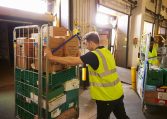Driving Sustainable Logistics:
The Role of Non-Asset-Based 3PL Providers
Sustainable logistics involves integrating environmental, social, and economic or government (ESG) considerations into logistics activities management. With growing awareness of the importance of supply chains' environmental impact and social responsibility, non-asset-based logistics providers are crucial in advancing sustainable logistics through the full value chains, leveraging their extensive networks and expertise. A strong 3PL partner can make a significant difference in achieving core ESG goals.
Key Drivers of Sustainable Logistics
Environmental concerns, regulatory compliance, cost savings and efficiency, and consumer demand for sustainable practices drive sustainability adoption in logistics. Addressing the logistics industry's contributions to carbon emissions and fossil fuel consumption is vital. Adhering to regulations and focusing on efficiency can also lead to long-term cost savings.
Where exactly?
Start with the major changes to ESG-focused legislation in both the US and around the globe. As reported by Dean Alms of Supply Chain Quarterly, 27% of Chief Procurement Officers prioritized ESG in 2022. Meanwhile, the German Supply Chain Due Diligence Act (LkSG) and US Uyghur Forced Labor Prevention Act (UFLPA) are now in effect and carry significant consequences for non-compliance.

How Non-Asset-Based Providers Contribute to Sustainable Logistics
A non-asset-based logistics brokerage drives sustainability by partnering with sustainable companies, implementing sustainable practices in daily operations, and encouraging transparency and communication. Such capabilities may include working with additional network partners that have also established ESG initiatives and actions. Further, dispelling myths about logistics outsourcing can help businesses understand these providers' value and realize the benefits of sustainable logistics.
Identifying green carriers and logistics partners allows non-asset-based providers to collaborate for innovative solutions, reducing waste, CO2 emissions, and overall carbon footprint. Route optimization, energy-efficient technologies, and waste reduction and recycling initiatives exemplify sustainable practices in daily operations.
Sharing sustainability goals with clients and partners and reporting on sustainability performance metrics fosters trust and accountability, promoting sustainable logistics and quality supply chains. Plus, working with third parties, such as a semi broker, with additional resources for tracking and defining your full sustainability impact will go a long way toward your commitment to ESG goals. Understanding how owner-operators and freight brokers work together can further enhance relationships.
The Future of Logistics Sustainability
Resistance to change, lack of awareness, and upfront costs are barriers to implementing sustainability in logistics. However, opportunities for non-asset-based providers to drive sustainable supply chains continue to grow with emerging trends like alternative fuels and gains in automation through the last mile. Focusing on these opportunities, non-asset-based providers can contribute to more environmentally friendly and socially responsible operations. Considering their commitment to sustainable logistics is crucial when planning to outsource processes to a 3PL or trucking broker. That may include:
- Identifying the 3PL’s network ESG partnerships.
- Expanding your services list based on the value added from such partnerships.
- Creating new projects and opportunities to optimize supply chains.
- Consolidating shipments to distribution facilities or retail stores.
- Reducing waste in packaging and palletizing.
- Leveraging multimodal transport like ocean or rail for low-emission options
- Recommitting to maintaining labor rights and vigilance across all your operations in-house and your entire value chain.
Realize Sustainable Logistics With GEODIS Capacity Solutions
Non-asset-based logistics providers are essential in promoting sustainability. They can foster collaboration and innovation to drive sustainable supply chains by leveraging their networks and expertise. As the logistics industry evolves, these partnerships' potential for a more sustainable future is immense. Embracing environmentally friendly and socially responsible practices, non-asset-based providers can create a greener, more responsible logistics landscape, benefiting businesses, consumers, and the planet.
At GEODIS, sustainability is central to our business strategies, operations, client relationships, and several other areas. In 2022, GEODIS committed to set Science Based Targets (SBT). Connect with a GEODIAN team member from Capacity Solutions to get started today.
Latest News




Categories
